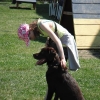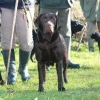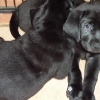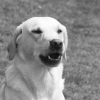Dogs as Individuals….
I have been thinking about this post for quite a while reading forum questions and concerns from callers and trainees and so on.
I’m not saying this is gospel but opinion. However it is opinion based on a fair spread of Labradors as a breeder, owner, trainer and competitor.
I harp on a fair bit in a lot of my answers to behavioural and training issues that involve shyness, fear aggression, uneasiness such as barking at family members, strangers or odd objects until they twig they are ‘ok’ and so on. I put an awful lot of the ‘blame’ for this reaction in your dogs to breeding. Not bad breeding, or good breeding, just what is inherited from the dogs parents.
We all read that socialisation is important. It absolutely, certainly is. however you can socialise until you are blue in the face and SOME dogs, even our ‘supposedly solid, dependable’ breed will still have a nervous reaction to certain situations. That react differently to how we would like them to ideally as a Labrador.
Let me give you a practical example. I have two lines running through my kennel of dogs. I will call them ‘W’ and ‘P’ simply because of the background of the two and the breeding of the dogs. The ‘W’s started with a bitch who had a timid and clingy streak through her. She would react before she thought things through. She had 4 litters of puppies over 7 years to 4 different sires and every single litter produced the same result. Puppies a little more confident than her but not as confident and bold as we would like them to be.
We are 5 generations down from the original ‘W’ bitch. Yet even her Great grandaughter, with all that breeding inbetween, can be walked through a busy showground offlead and will stick close to me, looking at all and sundry as if they are out to try and lead her astray. She is clingy. She makes me look good as a trainer because with a single word she will heel through a crowd of dogs and humans because she only wants me, not them.
Ok, so now we turn to ‘P’ of whom I have only two generations, but a close friend of mine has 7 generations of these bred dogs and I have known for 20 years. ‘P’s are bold, happy, generous of soul, are tumblers, players, social creatures who love other dogs and think every other human was put on this earth to jump up at and be fussed by. Walk through a showground with a ‘P’ and they tug you from side to side wanting to say ‘hello’ to all and sundry.
All the ‘W’s and all the ‘P’s were socialised as puppies from 6 weeks old in exactly the same way. Exactly. They eat the same food, they live the same routine, they have the same formal and informal training.
So, what I am saying here is that you need to look at your own Labrador and think hard about whether his problems, barking at strangers, putting his hackles up at strange dogs or people (but not wading for attack for anything like that), being nervous of new people, hating men in hats, not being keen on puppies, being shy of crowds and noises, barking before they THINK about what their eyes are seeing, Being defensive about the house and so on are traits that really the dog can help. If it is not something just genetically programmed and you can worry till the cows come home but this just *is* a slightly more timid Labrador than the one round the corner.
Myself, I love the complex dogs. The ones you could walk offlead round that damn showground and trust them to want to be with you more than any other dog or person. The ones that defy the image of a socialable, slightly dimwitted, love everyone, labrador retriever. Indeed I apologise to runners when half my gang back off and bark at them and half charge up and want to know why on EARTH they are running and not cuddling them….
Try and take time to think about your lab and if their problems as percieved might be inherited and something you need to learb to admire and live with. Something you need to learn tol yell ‘oh for gods sake flossie, its only Daddy’ as they stand and defend your honour with their barking as he comes in from a night shift….
They all need seeing as absolutely individuals, not just a single breed.
Di







